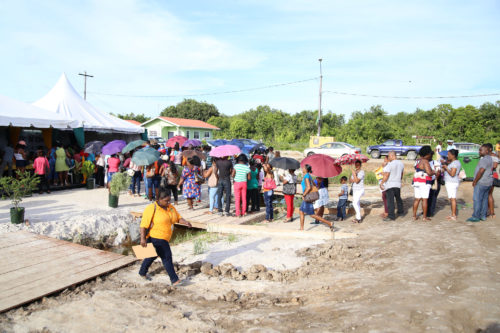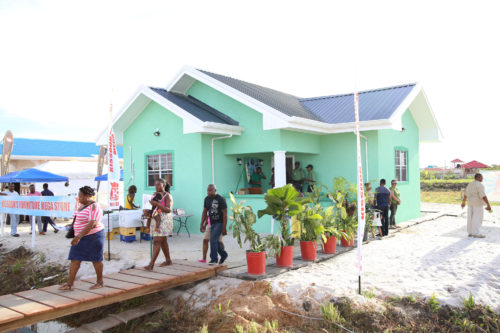The Central Housing and Planning Authority (CH&PA) will be using data collected during the Housing Solutions 2017 and Beyond Expo to inform future housing developments, Chief Executive Officer (CEO) of the agency Lelon Saul said on Monday.
Saul stated that according to the figures he saw on Monday morning, as much as 40% of patrons were interested in the duplexes, but noted that further analyses would need to be done as the data suggests that their interest in that housing type is limited to the Perseverance scheme, and not necessarily other locations.

He stated too that the majority of attention was paid to the single unit houses.
“Our information basically is to help us plan in the future because that data will guide us on exactly what people want and so our future development would be influenced by that data,” he said.
According to the CEO, Perseverance has close to 400 house lots, which already have 200 turnkey homes. Within the next three months, he said, they will be rolling out their 20 three-bedroom, bungalow-type houses.
Saul could not speak to the cost of the project, but stated that an average of $3million is usually spent to develop an acre.
“Additionally, for the houses that we build… the average cost for one of the duplexes is $17 million and the single elevated house that you see across there is $7 million for one, the average price. The final price to the beneficiary—of course we are subsidizing that—we are selling these units below the price that we actually pay to develop them,” he explained.

The Perseverance scheme is already equipped with running water and electricity, and the roads are set to be completed soon. Saul stated that the monies have already been allocated for the road works, and so work will commence as soon as the rain eases.
In terms of security concerns residents may have, Saul noted that creating a safe space is part of the Communities Ministry’s agenda and that the community will cater to residents’ social needs.
“At CH&PA, we are in the business of creating safe, cohesive, empowered and sustainable communities. Mean-ing, the design for our communities, it caters for social amenities. And obviously in this area and in our schemes there are places that are reserved for police stations and fire services and the health facility and everything. Because we are creating holistic communities. So, yes perhaps not now, but in the medium to long term, you will probably see a police station or a police outpost inside here,” he added.
According to the CEO, CH&PA will be rolling out duplexes in nine other areas, in five regions: Onderneeming in Pomeroon-Supenaam (Region 2); Onderneeming on the West Bank of Demerara (Region 3); Tuschen, East Bank Essequibo (Region 3); Plantation Laurentia, West Bank Deme-rara (Region 3); Hope/Experi-ment on the West Coast of Berbice (Region 5); Ordnance Fortlands in Canje, Berbice (Region 6); Grant, New Amsterdam (Region 6); Amelia’s Ward, Linden (Region 10); and Wisroc (Region 10).
Saul stated that after prospective homeowners would have satisfied the financial prerequisites, new residents would be selected using a “form of lottery,” which he believed would be the most transparent method.
Hundreds of potential homeowners flocked the Perseverance Housing Scheme, on the East Bank of Demerara, on Friday to get a glimpse of affordable housing options available at the Housing Solutions 2017 and Beyond Expo, which was opened by the CH&PA.
In his brief remarks at the opening, Minister of Communities Ronald Bulkan said that Perseverance represents an acknowledgement of a new approach that was needed. He said that the project, which is known as the ‘1,000 Homes Project,’ started in 2013. In the next year, he said, the first batch of 50 houses were constructed. However, by the end of 2015 and at the time the new administration took over, none of the new houses could be occupied.
Bulkan said this reality immediately informed the government that the approach was wrong and that the state was not geared to be an efficient builder of homes. He said that the role of the state should be a facilitator and to create an enabling environment and to allow the private sector, in an open and competitive process, to construct the houses.




